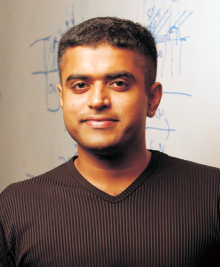Two faculty from the Department of Electrical Engineering at the University of Notre Dame, associate professor Debdeep Jena and research associate professor Thomas Pratt, have each received Defense University Research Instrumentation Program (DURIP) grants from the Department of Defense for 2012, totaling more than $650,000.
Highly competitive awards, DURIP grants enable the purchase of state-of-the-art equipment, which augments the University’s abilities to perform fundamental cutting-edge research and accelerates research progress for the next generation of engineers and scientists in defense-critical fields.
 Debdeep Jena
Debdeep Jena
Jena, who serves as principal investigator along with John Cardinal O’Hara, C.S.C., Associate Professor Huili (Grace) Xing, co-investigator, and a number of senior investigators in the electronic materials and devices group at Notre Dame, will receive $400,000 for the purchase of a chemical beam epitaxy system for the growth of complex oxide materials and heterostructures. The system will help the researchers better understand complex oxide crystals, how they are developed and how to best create them, in order to design new materials that will enable smaller, faster and more energy-efficient electronic, optical and magnetic devices. The team will be able to see and study the nature of chemical bonds that lead to specific material properties, which can then be exploited for electronic devices.
A faculty member since 2003, Jena’s research focuses on the growth and properties of III-V semiconductors and their application in high-speed electronic devices and optoelectronic devices. His group also investigates and develops nanostructured semiconducting materials such as graphene, nanowires and nanocrystals for device applications. Their experimental work is driven by theoretical underpinning of charge, heat and spin transport in nanomaterials.
Jena is the author of several journal publications, including articles in Science, Physical Review Letters, and Electron Device Letters. He received the National Science Foundation’s CAREER award in 2007 and the University’s Edmund P. Joyce award for excellence in undergraduate teaching in 2010.
 Thomas Pratt
Thomas Pratt
Pratt will receive $257,670 for equipment to build-up a Multiple-Input, Multiple-Output (MIMO) Radio Frequency (RF) channel emulation system to recreate complex wireless propagation channels. The system, which will include an Agilent Technologies channel emulator and signal generators, will enable testing and evaluation of wireless technologies and will be used in a study for the Navy to investigate power-efficient wireless communications technologies for expeditionary forces.
A 1985 Notre Dame graduate who returned to the University in 2008, Pratt’s research focuses on physical layer issues associated with wireless communications, radar and RF sensor systems, especially technologies that leverage dual-polarized and multiple-antenna architectures. Prior to his appointment at Notre Dame, Pratt was a principal research engineer at the Georgia Tech Research Institute, where he had conducted systems research associated with RF and communications systems for more than 23 years.
Pratt holds a patent on signal processing for GSM receivers and has three patents pending associated with multi-port adaptive transmission, interference suppression algorithms and polarization-based sensing, respectively. In addition, he has authored or coauthored more than 100 reports and publications and is a senior member of the Institute of Electrical and Electronics Engineers.
More than 700 proposals requesting $226 million were received, identifying projects from advancements in surface chemistry and physics to neuroscience, robotics, environmental engineering, electronics and more. Approximately 190 of those proposals were funded, with award amounts ranging from $50,000 to $1.9 million.